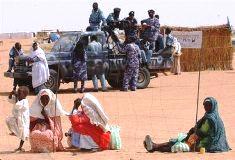Sudanes government hasn’t reined in Arab militias, diplomats say
By EDITH M. LEDERER, Associated Press Writer
UNITED NATIONS, Aug 25, 2004 (AP) — As a U.N. deadline for action nears, the Sudanese government has not reined in Arab militias accused of attacking, raping and killing villagers in the western Darfur region, diplomats said a U.N. official told the Security Council.
 Assistant Secretary-General Tuliameni Kalomoh told council members at a closed-door meeting Tuesday that the United Nations continues to receive reports of attacks by the militiamen, known as the Janjaweed, as well as reports of looting and harassment by men in uniform, according to council diplomats.
Assistant Secretary-General Tuliameni Kalomoh told council members at a closed-door meeting Tuesday that the United Nations continues to receive reports of attacks by the militiamen, known as the Janjaweed, as well as reports of looting and harassment by men in uniform, according to council diplomats.
But Kalomoh told the council that humanitarian aid access has improved and there was good cooperation from the government in identifying safe havens for the hundreds of thousands of Sudanese forced to flee their homes to escape the violence, said diplomats who were at the meeting, speaking on condition of anonymity.
Kalomoh’s briefing took place ahead of the Aug. 30 deadline the council set in a resolution adopted a month ago calling for the government to demonstrate that it was taking action to curb the Janjaweed and improve security and humanitarian access.
U.N. officials say Darfur has become the scene of the world’s worst humanitarian crisis since African rebels rose against the government in February 2003, claiming discrimination in the distribution of scarce resources. The government has been accused of trying to crush the revolt by backing a scorched earth policy carried out by the Janjaweed an accusation it denies although last week it acknowledged it has “control” over some Janjaweed fighters.
Khartoum has promised to give the United Nations a list of militants suspected of involvement in the bloodshed, but Kalomoh told the council it has not yet received any names, the diplomats said.
The resolution threatened punitive economic and diplomatic measures if Khartoum didn’t move quickly. But Britain’s Foreign Office said Friday a majority of Security Council members oppose immediate heavy sanctions if Sudan fails to quell the violence, which has killed up to 30,000 and forced more than 1 million to flee their homes.
A statement by the council after Tuesday’s meeting made no mention of any punitive measures.
Instead, the council gave “strong support” to the African Union’s efforts to tackle the crisis in Darfur and urged the Sudanese government and rebel leaders meeting under AU auspices in the Nigerian capital, Abuja, to reach a political settlement and end the violence.
The African Union already has 80 observers in Darfur, protected by 150 Rwandan troops, to monitor a rarely observed cease-fire between black African rebels and government-backed Arab militias. But an AU plan to send nearly 2,000 peacekeepers to monitor the region, which is the size of France with 147 known refugee camps, was rejected Monday by a senior Sudanese official.
Pakistan’s U.N. Ambassador Munir Akram, an opponent of sanctions, said he believed Tuesday’s meeting “provided us an opportunity for a course correction to go towards a more realistic, practical strategy based on … cooperation with the Sudanese, cooperation with the AU, and a collective effort by the international community rather than a coercive effort.”
“At the moment the picture is mixed,” he said, and the council needs to work with the government to improve it.
U.S. deputy ambassador Stuart Holliday said Washington hasn’t ruled out sanctions, but he focused on the proposals to beef up the African monitoring and protection force and applauded Nigerian President Olusegun Obasanjo, the AU president who is also spearheading the political talks.
“People are still dying and they’re still scared in Darfur, and I think the important thing is to address the protection and security issues that remain,” he said.
Secretary-General Kofi Annan is expected to send a written report to the council by Aug. 30 on the government’s implementation of the Darfur Plan of Action which spelled out specific steps it needed to take. His special representative to Sudan, Jan Pronk, is expected to brief the council on Sept. 2.
Russia’s U.N. Ambassador Andrey Denisov, the current council president, said members were waiting for Pronk’s report before making a determination.
Asked for Russia’s assessment of Khartoum’s progress so far, he said, it is “propelling in a positive direction, but still there is a long way to go to implement the resolution … and to prevent humanitarian suffering.”
According to council diplomats, Kalomoh also said that while humanitarian access was better, the Sudanese military was still blocking humanitarian flights and Sudanese authorities were exerting excessive pressure to get those who fled to return to their villages.
